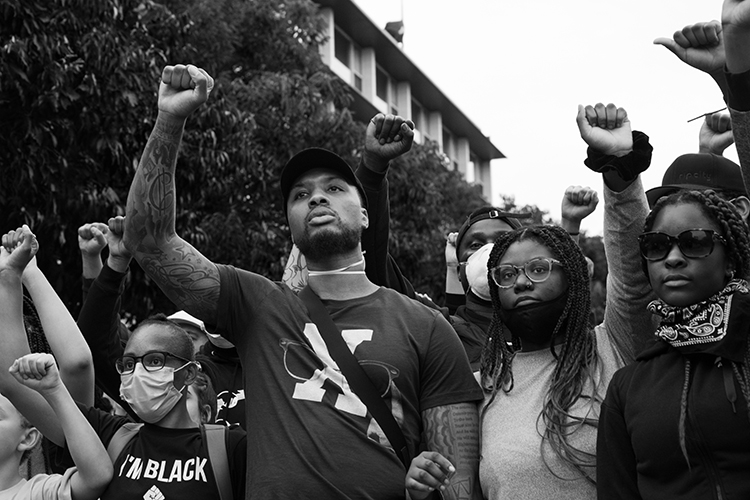‘Generation Kaepernick’: Activist-athletes uplift voices for justice
The athletes responding to injustice across the country today are echoing a centuries-long tradition of athlete-activists standing in solidarity with movements for justice, a panel of athletes, educators and poets said during an online event Thursday.

August 28, 2020
The athletes responding to injustice across the country today are echoing a centuries-long tradition of athlete-activists standing in solidarity with movements for justice, a panel of athletes, educators and poets said during an online event Thursday.
“Rise Up for Justice: Activist-Athletes Elect Justice,” organized by UC Berkeley’s Othering & Belonging Institute, in partnership with Athletes for Impact, Elect Justice, Revolve Impact and Vote.org, examined how sports can shine a spotlight on social movements.
The latest wave of athlete protests erupted Wednesday when the Milwaukee Bucks NBA team refused to participate in its match on Wednesday night, calling for justice after the police shooting of Jacob Blake in Kenosha, Wisconsin. Blake was shot in the back seven times, leaving him paralyzed from the waist down, according to his father.
The Bucks catalyzed a national strike wave that is spreading across sports, leaping from the NBA to the national soccer, baseball and women’s basketball leagues.
“These athletes know the power they have,” one of the panelists, Michael Bennett, former NFL player and member of Athletes for Impact, said. “Athletes are the voice for a lot of different things. To be the voice of humanity, I think that’s the biggest thing we all can do.”
Panelists agreed that sports and politics are intertwined, and that sports can uplift the currents of social change. Another theme present in the discussion was that struggles for racial justice and Black liberation are tied to other movements.
Collegiate track-and-field athlete Rosalie Fish agreed, pointing to what she called the significance of “solidarity between groups who are facing parallel struggles.”
Fish, an advocate for Missing and Murdered Indigenous Women, recalled her experiences in Seattle, where she and others consistently showed up at different protests in support of Black lives, migrant justice and trans rights.
“When we amplify each others’ voices, we are that much louder, we are that much stronger,” she said.
Fish and co-panelist Janelle Gray, both youth activists who began their work during high school, reiterated the need for young people and other student-athletes to join in the demonstrations.
Gray pointed to Colin Kaepernick, former quarterback for the San Francisco 49ers, saying he was the most recent spark to inspire many young people to sacrifice “for the sake of their people.”
David Zirin, sports historian and moderator of the event, named this wave “Generation Kaepernick.”
The humanity of athletes and their connection to their communities was another key point of discussion. Zirin urged the audience to remember that “athletes are not activists in a vacuum, that these athletes are stepping up precisely because people are stepping up in the streets.”
He argued that movements start from the ground up to transform political and social spheres, including the world of sports.
“It always starts with the actions of ordinary people who will never be on the cover of Sports Illustrated,” Zirin said.
Zirin pointed to Muhammad Ali’s career in boxing, noting that the freedom struggles of the 1960s transformed Cassius Clay into the Ali now known as a prolific activist.
“Athletes both give, and they respond,” said Zirin, “and they also take in and learn from what we’re doing in the streets.”
Andrea Hailey, CEO of political participation advocacy group Vote.org, said that there is a groundswell of people engaging in electoral politics, especially during the conjuncture of voter suppression, a health pandemic and the rise of athlete-activism.
“The story of this year is resiliency,” she said, “resiliency of the American people, resiliency of the American voter.”
The event also saw the unveiling of a new voter outreach initiative, Elect Justice, which musician and social advocate Mike de la Rocha introduced. The project seeks to encourage people, especially “underrepresented and ignored voters,” de la Rocha said, to participate in local politics and in building community power.
Rafael Jesús González, poet laureate of the city of Berkeley, concluded the discussion. He echoed Hailey, stating that a movement for collective justice has arisen across the country.
“It is the earth that we are fighting for, for each other and for love,” González said. “Let’s make a revolution, and let’s make it now.”
Thursday’s online event was the second installment of the Othering & Belonging Institute’s #RiseUp4Justice live discussion series. The first followed the murder of George Floyd and ensuing international uprisings.